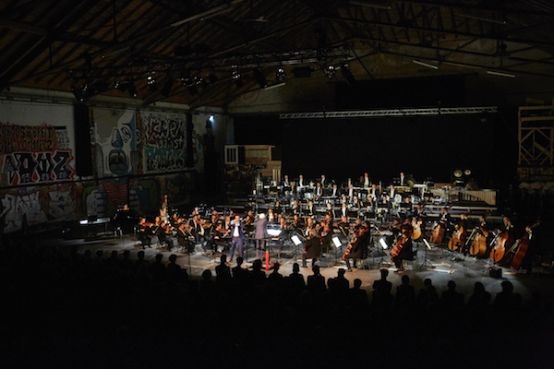Timeless at an inopportune time
This year's edition of the Bern Music Festival explored questions of time and temporality. We took the time to visit one day of the festival.

The rooster on Bern's Zytglogge not only crowed at the wrong time that day, but several times during the festival from September 5 to 9. The culprit was Markus Marti, time bell ringer for 40 years, who, together with Christoph Hess alias Strotter Inst., transformed the Bernese landmark into an impressive sound backdrop. Instead of just before the hour, as is usually the case, the rooster crowed in the middle of the hour. The tourists who stayed outside may have been pleased, but the visitors to the installation Crazy time bells probably even more. On the second floor of the tower, Marti masterfully manipulated the monumental clockwork, shortening the time and using the imposing machinery to produce a broad spectrum of sounds - coarse-mechanical in their handling, subtle in their effect - that perfectly matched the turntable composition specially conceived for the occasion. Closed season of Strotter Inst. was coordinated.
During the Bern Music Festival, the federal city is always transformed into one big concert venue. Landmarks, outer districts, even the station forecourt: everything is played. This year, often at unusual times. Under the festival motto "untimely", the festival management even dared visitors to attend a concert at 11:59 pm, shortly before the witching hour. In a private apartment in Münstergasse. After an intensive day at the festival, this is definitely not the best time to listen to the quiet, subtly changing sounds envisaged by Biel sound artist Jonas Kocher in his concept "Home (Münstergasse 37)". It was not due to the quality of the performance by Ensemble Aabat that some visitors soon lost their patience and left the old town apartment in a huff.
Eruptive blocks of sound
There was no lack of intensity in the concert three hours earlier in the Great Hall of the Reitschule. Two weighty works by Bernd Alois Zimmermann were on the program: the trumpet concerto Nobody knows de trouble I see (1954) and the ecclesiastic action I turned around and looked at all the injustice that happened under the sun (1970). Few composers in the 20th century dealt with questions of time as intensively as Zimmermann. He developed the concept of the "spherical shape of time", in which different layers of time can overlap, and wove different musical styles into an astonishingly homogeneous whole in his works. The appointment of the composer, who died in 1970 and would have been 100 years old this year, as the festival's Composer in Residence was an obvious choice.
The large Bern Symphony Orchestra under the direction of Mario Venzago precisely captured the mood of the trumpet concerto. The orchestra skillfully harmonized sonority and drive and allowed the music to tilt splendidly into the obligatory jazz furioso. The young trumpet virtuoso Simon Höfele knew how to shine incessantly. The Swiss Youth Choir (conducted by Nicolas Fink) then transported the audience to a completely different world. As a kind of conciliatory intermezzo between the two eruptive, accusatory blocks by Zimmermann, the young singers interwove Thomas Tallis' forty-part motet Spem in alium nunquam habui (around 1570) into a touching and dense continuum of sound, which came across well despite the sparse reverberation in the Reithalle. However, the ecclesiastical action for two speakers, baritone solo and orchestra left many listeners completely baffled. Robin Adams (baritone), Julia Kiesler (narrator) and Franz Mazura (narrator) gave it their all, and the interpretation was strong. Zimmermann's last stand before his suicide, which often went beyond the pain threshold with its slanting orchestral passages, nevertheless left many question marks, and in a weak moment one found oneself wishing that the Bern Music Festival had appointed the timeless Thomas Tallis as composer in residence instead of Zimmermann.
Sophisticated and witty
Jürg Kienberger as Interluder in Residence and Christian Grüny as Festival Philosopher, on the other hand, left unrestricted feelings of happiness in their wake. Kienberger repeatedly appeared in concerts with subtle little disruptive maneuvers, for example late at night in the French Church, to stylishly counteract the performance of two funeral cantatas by Bach and Telemann. The interpretation of the cantatas themselves by the vocal ensemble BernVocal, accompanied by a top-class ensemble of soloists, reached heavenly spheres.
Grüny in turn interluded wittily under the motto "Resonance and Repetition" in the art museum, which, with the Hodler paintings currently on display, provided a pleasant atmosphere for the performance of two contrasting cello pieces by Zimmermann and Michael Pelzel.
-

- In der Zeitkugel, concert in the large hall of the Berner Reitschule
- Simon Hofele, trumpet; Robin Adams, baritone; Franz Mazura, narrator; Julia Kiesler, narrator; Bern Symphony Orchestra, conducted by Mario Venzago; Swiss Youth Choir, conducted by Nicolas Fink








